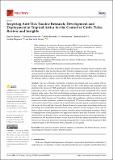Por favor, use este identificador para citar o enlazar a este item:
http://hdl.handle.net/10261/334320COMPARTIR / EXPORTAR:
 SHARE SHARE
 CORE
BASE CORE
BASE
|
|
| Visualizar otros formatos: MARC | Dublin Core | RDF | ORE | MODS | METS | DIDL | DATACITE | |

| Título: | Inspiring anti-tick vaccine research, development and deployment in tropical Africa for the control of cattle ticks: Review and insights |
Autor: | Kasaija, Paul D. CSIC; Contreras, Marinela CSIC ORCID ; Kirunda, Halid; Nanteza, Ann; Kabi, Fredrick; Mugerwa, Swidiq; Fuente, José de la CSIC ORCID | Palabras clave: | Ticks Anti-tick vaccines Anti-tick antigens Vaccinomics Tick-borne diseases Reverse vaccinology Personalized vaccines Immune response |
Fecha de publicación: | 2023 | Editor: | Multidisciplinary Digital Publishing Institute | Citación: | Vaccines 11(1): 99 (2023) | Resumen: | Ticks are worldwide ectoparasites to humans and animals, and are associated with numerous health and economic effects. Threatening over 80% of the global cattle population, tick and tick-borne diseases (TTBDs) particularly constrain livestock production in the East, Central and Southern Africa. This, therefore, makes their control critical to the sustainability of the animal industry in the region. Since ticks are developing resistance against acaricides, anti-tick vaccines (ATVs) have been proposed as an environmentally friendly control alternative. Whereas they have been used in Latin America and Australia to reduce tick populations, pathogenic infections and number of acaricide treatments, commercially registered ATVs have not been adopted in tropical Africa for tick control. This is majorly due to their limited protection against economically important tick species of Africa and lack of research. Recent advances in various omics technologies and reverse vaccinology have enabled the identification of many candidate anti-tick antigens (ATAs), and are likely to usher in the next generation of vaccines, for which Africa should prepare to embrace. Herein, we highlight some scientific principles and approaches that have been used to identify ATAs, outline characteristics of a desirable ATA for vaccine design and propose the need for African governments to investment in ATV research to develop vaccines relevant to local tick species (personalized vaccines). We have also discussed the prospect of incorporating anti-tick vaccines into the integrated TTBDs control strategies in the sub-Saharan Africa, citing the case of Uganda. [Simple Summary] Ticks affect the health of humans and animals. In tropical African countries, cattle are threatened by ticks and the diseases they transmit, making necessary a tick control to avoid endangering the production of this industry. In this review, different vaccine candidates and different approaches are proposed as an environmentally friendly control alternative that can be included in the strategies of these countries to prevent tick-borne diseases their consequences. |
Descripción: | This article belongs to the Special Issue New Approaches in Vaccine Development for the Control of Vectors and Vector-Borne Diseases. | Versión del editor: | https://doi.org/10.3390/vaccines11010099 | URI: | http://hdl.handle.net/10261/334320 | DOI: | 10.3390/vaccines11010099 | E-ISSN: | 2076-393X |
| Aparece en las colecciones: | (IREC) Artículos |
Ficheros en este ítem:
| Fichero | Descripción | Tamaño | Formato | |
|---|---|---|---|---|
| inspirinsi.pdf | 1,48 MB | Adobe PDF |  Visualizar/Abrir |
CORE Recommender
PubMed Central
Citations
2
checked on 15-abr-2024
SCOPUSTM
Citations
4
checked on 28-abr-2024
WEB OF SCIENCETM
Citations
2
checked on 29-feb-2024
Page view(s)
19
checked on 02-may-2024
Download(s)
17
checked on 02-may-2024

